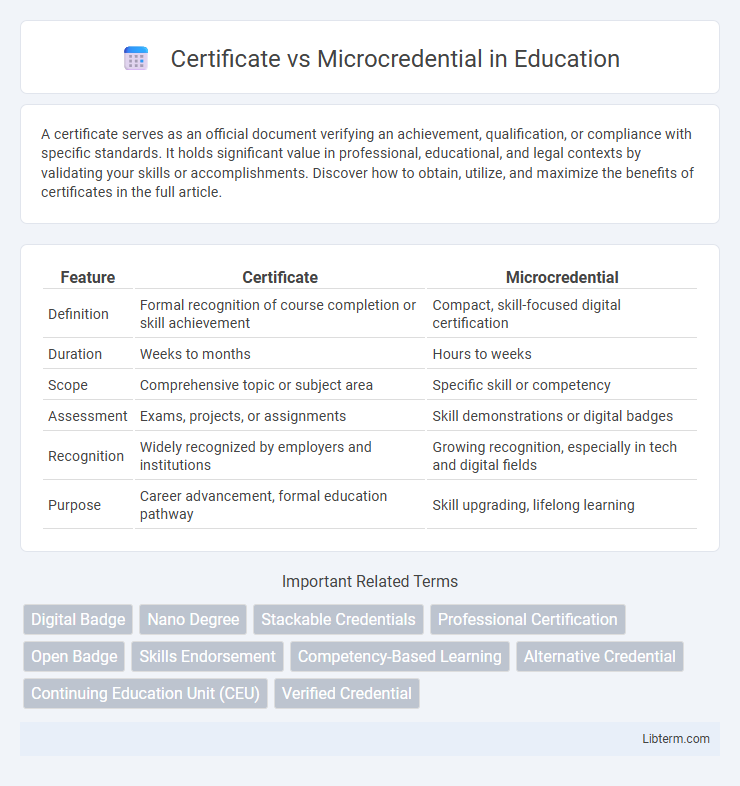A certificate serves as an official document verifying an achievement, qualification, or compliance with specific standards. It holds significant value in professional, educational, and legal contexts by validating your skills or accomplishments. Discover how to obtain, utilize, and maximize the benefits of certificates in the full article.
Table of Comparison
| Feature | Certificate | Microcredential |
|---|---|---|
| Definition | Formal recognition of course completion or skill achievement | Compact, skill-focused digital certification |
| Duration | Weeks to months | Hours to weeks |
| Scope | Comprehensive topic or subject area | Specific skill or competency |
| Assessment | Exams, projects, or assignments | Skill demonstrations or digital badges |
| Recognition | Widely recognized by employers and institutions | Growing recognition, especially in tech and digital fields |
| Purpose | Career advancement, formal education pathway | Skill upgrading, lifelong learning |
Introduction to Certificates and Microcredentials
Certificates and microcredentials represent distinct forms of credentialing designed to validate specific skills or knowledge acquired through targeted education. Certificates typically signify completion of broader, more comprehensive programs recognized by institutions, often spanning several months to a year and covering extensive subject matter. Microcredentials focus on demonstrating mastery of precise competencies or skills, frequently offered as shorter, modular, and stackable units aligned with industry needs and digital badges.
Defining Certificates
Certificates are formal recognitions awarded by educational institutions or professional organizations to validate the completion of a specific course or program, often emphasizing theoretical knowledge. Unlike microcredentials that typically target skill-specific achievements, certificates encompass broader subject areas and may require longer study periods. They serve as key credentials for career advancement, credential verification, and professional development across various industries.
What are Microcredentials?
Microcredentials are short, focused learning experiences designed to validate specific skills or competencies, often in rapidly evolving fields like technology, healthcare, or business. Unlike traditional certificates that cover broad subject areas over extended periods, microcredentials provide targeted, stackable credentials that can be completed in weeks or months. These credentials enhance employability by demonstrating mastery of particular abilities valued by employers and educational institutions.
Key Differences Between Certificates and Microcredentials
Certificates typically represent comprehensive learning achievements encompassing a broad subject area, often requiring extended study periods, while microcredentials focus on specific skills or competencies achievable in shorter time frames. Certificates are usually issued by educational institutions and hold formal recognition, whereas microcredentials can be offered by a variety of providers, including industry organizations, emphasizing skill validation and workforce relevance. The key difference lies in depth versus specificity: certificates provide broad expertise validated through structured curricula, microcredentials offer targeted proof of skill mastery ideal for agile career development.
Duration and Time Commitment
Certificates generally require a longer duration, often spanning several months to a year, with a significant weekly time commitment ranging from 5 to 15 hours. Microcredentials are designed for shorter completion times, typically a few weeks to a couple of months, demanding less weekly effort, usually between 1 to 5 hours. This difference in duration and time commitment makes microcredentials ideal for learners seeking rapid skill acquisition and flexibility.
Curriculum and Learning Outcomes
Certificates typically encompass a comprehensive curriculum designed to provide in-depth knowledge and mastery of a subject, often spanning several months to a year, with clearly defined learning outcomes aligned to industry standards or academic requirements. Microcredentials focus on specific skills or competencies within a narrower scope, allowing learners to gain targeted expertise quickly, with learning outcomes centered on practical application and immediate relevance to career advancement. Both emphasize measurable outcomes, but certificates offer broader foundational knowledge while microcredentials prioritize skill specialization and flexibility.
Recognition and Accreditation
Certificates often carry formal recognition and accreditation from established educational institutions or industry bodies, providing widely accepted credentials that validate specific skills or knowledge. Microcredentials, while growing in acceptance, typically offer targeted, stackable achievements that may or may not be formally accredited but are designed to demonstrate proficiency in niche competencies. Recognition of microcredentials varies by industry and employer, emphasizing their flexibility and relevance in rapidly evolving fields.
Career Impact and Industry Relevance
Certificates often provide comprehensive, formal recognition of skills that align with industry standards, enhancing career prospects through established credibility. Microcredentials focus on specific, targeted skills that address emerging industry needs, allowing professionals to quickly adapt to evolving job market demands. Both types of credentials increase employability, but microcredentials offer greater flexibility and speed in demonstrating expertise relevant to niche career paths.
Cost Comparison: Certificates vs. Microcredentials
Certificates generally require a higher financial investment, often ranging from several hundred to several thousand dollars due to their comprehensive curriculum and accreditation costs. Microcredentials tend to be more affordable, typically priced between $100 and $500, reflecting their focused skill-specific content delivered in shorter timeframes. Cost-effectiveness of microcredentials makes them attractive for professionals seeking targeted expertise without the extensive commitment associated with traditional certificates.
Choosing the Right Path for Your Professional Growth
Selecting between a certificate and a microcredential depends on your career goals and desired skill depth; certificates typically offer comprehensive knowledge over a longer period, while microcredentials focus on specific skills or competencies through shorter, targeted learning. Employers increasingly recognize microcredentials for their flexibility and relevance to emerging industry needs, making them ideal for professionals seeking quick upskilling or specialization. Assess the value of certification providers, industry recognition, and how each aligns with your professional development strategy to ensure the optimal path for career advancement.
Certificate Infographic

 libterm.com
libterm.com